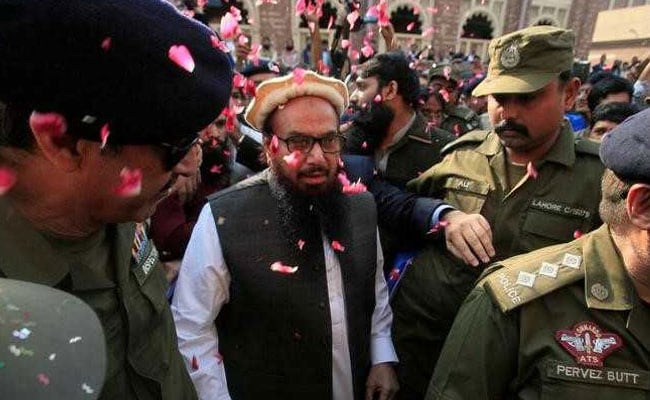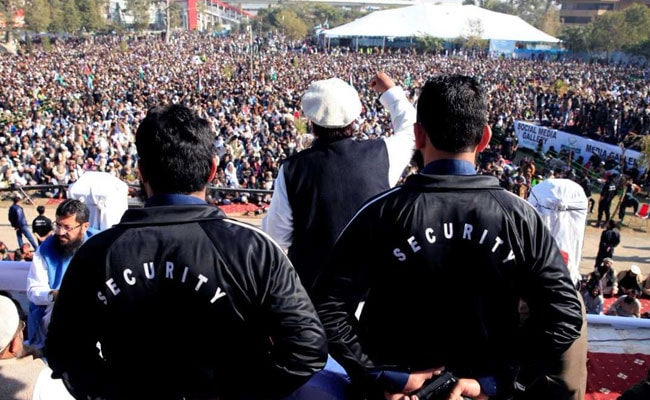
A Pakistani court has said it saw insufficient evidence to convict Hafiz Saeed for the Mumbai attacks.
Pakistan's government plans to seize control of so-called charities and financial assets linked to 26/11 Mumbai attacks mastermind Hafiz Saeed, according to officials and documents reviewed by Reuters.
The Pakistani government detailed its plans in a secret order to various provincial and federal government departments on December 19, three officials who attended one of several high-level meeting discussing the crackdown said.
Marked "secret", the document from Pakistan's finance ministry directed law enforcement and governments in the country's five provinces to submit an action plan by December 28 for a "takeover" of the Jamaat-ud-Dawa (JuD) and the Falah-e-Insaniat Foundation, both run by Hafiz Saeed.
The United States has labelled the JuD and FIF "terrorist fronts" for the Lashkar-e-Taiba, which attacked Mumbai in November 2008, killing 166 people. Washington has offered a $10 million reward for information leading to Saeed's conviction over the Mumbai attacks.
Saeed has repeatedly denied involvement in the Mumbai attacks and a Pakistani court saw insufficient evidence to convict him.
 The Dec 19 document, which refers to "Financial Action Task Force (FATF) issues", names only Saeed's two purported charities and "actions to be taken" against them.
The Dec 19 document, which refers to "Financial Action Task Force (FATF) issues", names only Saeed's two purported charities and "actions to be taken" against them.
The FATF, an international body that combats money laundering and terrorist financing, has warned Pakistan it faces inclusion on a watch list for failing to crack down on financing terrorism.
Asked about a crackdown on JuD and FIF, Interior Minister Ahsan Iqbal, who co-chaired one of the meetings on the plan, responded only generally, saying he has ordered authorities "to choke the fundraising of all proscribed outfits in Pakistan".
In a written reply to Reuters, he also said Pakistan wasn't taking action under US pressure. "We're not pleasing anyone. We're working as a responsible nation to fulfil our obligations to our people and international community."
Spokesmen for the JuD and FIF both said they could not comment until they receive official notifications of the government's plans. "We don't have any intimation about any crackdown so far," FIF spokesman Salman Shahid told Reuters. "No one has asked us about our work or assets."
Saeed could not be reached for comment. He has frequently denied having ties to terrorists and says the organisations he founded and controls have no terrorism ties. He says he promotes an Islamic-oriented government through doing good works.
First Major Move
If the government follows through with the plan, it would mark the first time Pakistan has made a major move against Saeed's network, which includes 300 seminaries and schools, hospitals, a publishing house and ambulance services. The JuD and FIF alone have about 50,000 volunteers and hundreds of other paid workers, according to two counter-terrorism officials.
Participants at the meeting raised the possibility that the government's failure to act against the organisations could lead to UN sanctions, one of the three officials said. A UN Security Council team is due to visit Pakistan in late January to review progress against UN-designated "terrorist" groups.
 "Any adverse comments or action suggested by the team can have far-reaching implications for Pakistan," the official said.
"Any adverse comments or action suggested by the team can have far-reaching implications for Pakistan," the official said.
The Dec 19th document gave few details about how the state would take over Saeed's outfits, pending the plans submitted from the provincial governments. It did say it would involve government entities taking over ambulance services and accounting for other vehicles used by the organisations.
It says law enforcement agencies will coordinate with Pakistan's intelligence agencies to identify the assets of the two outfits and examine how they raise money.
The document also directs that the name of JuD's 200-acre headquarters, Markaz-e-Taiba, near the eastern city of Lahore be changed to something else "to make it known that the Government of "Punjab (province) solely manages and operates the Markaz (headquarters)".
The move to seize the so-called charities could spark some concern from the powerful military, which has proposed plans to steer Saeed and the JuD into mainstream politics. The military did not respond to a request for comment.
In August, JuD officials formed a new political party, the Milli Muslim League, and backed candidates who fared relatively strongly in two key parliamentary by-elections.
Washington warned Islamabad of repercussions after a Pakistani court in late November released him from house arrest. Punjab's provincial government had put Saeed under house arrest for 10 months this year for violating anti-terrorism laws. He was released in November last year.
(By Asif Shahzad, additional reporting by Drazen Jorgic; Editing by Bill Tarrant)
The Pakistani government detailed its plans in a secret order to various provincial and federal government departments on December 19, three officials who attended one of several high-level meeting discussing the crackdown said.
Marked "secret", the document from Pakistan's finance ministry directed law enforcement and governments in the country's five provinces to submit an action plan by December 28 for a "takeover" of the Jamaat-ud-Dawa (JuD) and the Falah-e-Insaniat Foundation, both run by Hafiz Saeed.
The United States has labelled the JuD and FIF "terrorist fronts" for the Lashkar-e-Taiba, which attacked Mumbai in November 2008, killing 166 people. Washington has offered a $10 million reward for information leading to Saeed's conviction over the Mumbai attacks.
Saeed has repeatedly denied involvement in the Mumbai attacks and a Pakistani court saw insufficient evidence to convict him.

Hafiz Saeed was released from his house arrest last November.
The FATF, an international body that combats money laundering and terrorist financing, has warned Pakistan it faces inclusion on a watch list for failing to crack down on financing terrorism.
Asked about a crackdown on JuD and FIF, Interior Minister Ahsan Iqbal, who co-chaired one of the meetings on the plan, responded only generally, saying he has ordered authorities "to choke the fundraising of all proscribed outfits in Pakistan".
In a written reply to Reuters, he also said Pakistan wasn't taking action under US pressure. "We're not pleasing anyone. We're working as a responsible nation to fulfil our obligations to our people and international community."
Spokesmen for the JuD and FIF both said they could not comment until they receive official notifications of the government's plans. "We don't have any intimation about any crackdown so far," FIF spokesman Salman Shahid told Reuters. "No one has asked us about our work or assets."
Saeed could not be reached for comment. He has frequently denied having ties to terrorists and says the organisations he founded and controls have no terrorism ties. He says he promotes an Islamic-oriented government through doing good works.
First Major Move
If the government follows through with the plan, it would mark the first time Pakistan has made a major move against Saeed's network, which includes 300 seminaries and schools, hospitals, a publishing house and ambulance services. The JuD and FIF alone have about 50,000 volunteers and hundreds of other paid workers, according to two counter-terrorism officials.
Participants at the meeting raised the possibility that the government's failure to act against the organisations could lead to UN sanctions, one of the three officials said. A UN Security Council team is due to visit Pakistan in late January to review progress against UN-designated "terrorist" groups.

Hafiz Saeed has enjoyed flagrant impunity from his inflammatory speeches in Pakistan.
The Dec 19th document gave few details about how the state would take over Saeed's outfits, pending the plans submitted from the provincial governments. It did say it would involve government entities taking over ambulance services and accounting for other vehicles used by the organisations.
It says law enforcement agencies will coordinate with Pakistan's intelligence agencies to identify the assets of the two outfits and examine how they raise money.
The document also directs that the name of JuD's 200-acre headquarters, Markaz-e-Taiba, near the eastern city of Lahore be changed to something else "to make it known that the Government of "Punjab (province) solely manages and operates the Markaz (headquarters)".
The move to seize the so-called charities could spark some concern from the powerful military, which has proposed plans to steer Saeed and the JuD into mainstream politics. The military did not respond to a request for comment.
In August, JuD officials formed a new political party, the Milli Muslim League, and backed candidates who fared relatively strongly in two key parliamentary by-elections.
Washington warned Islamabad of repercussions after a Pakistani court in late November released him from house arrest. Punjab's provincial government had put Saeed under house arrest for 10 months this year for violating anti-terrorism laws. He was released in November last year.
(By Asif Shahzad, additional reporting by Drazen Jorgic; Editing by Bill Tarrant)
© Thomson Reuters 2018
Track Latest News Live on NDTV.com and get news updates from India and around the world

